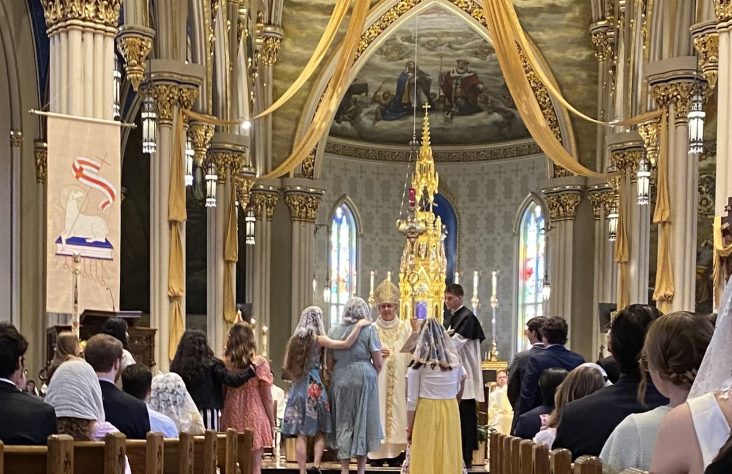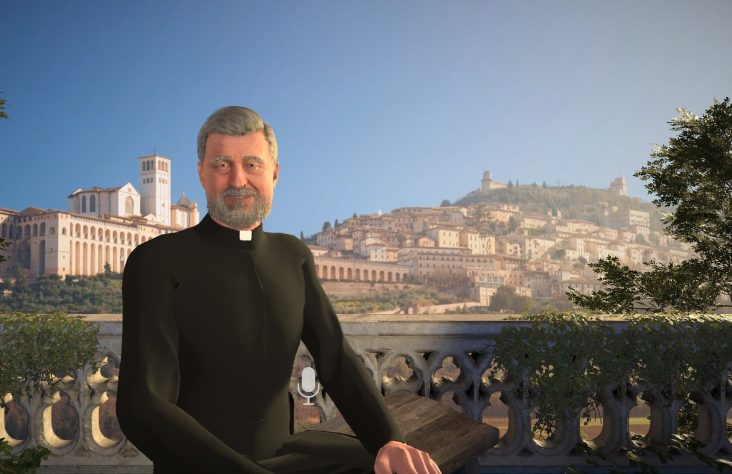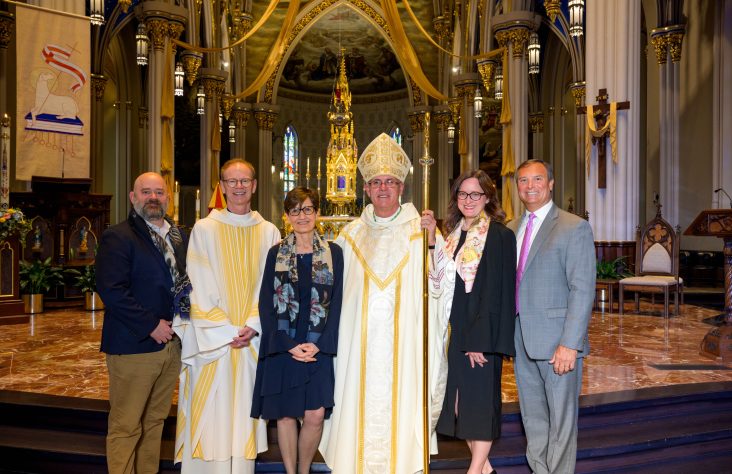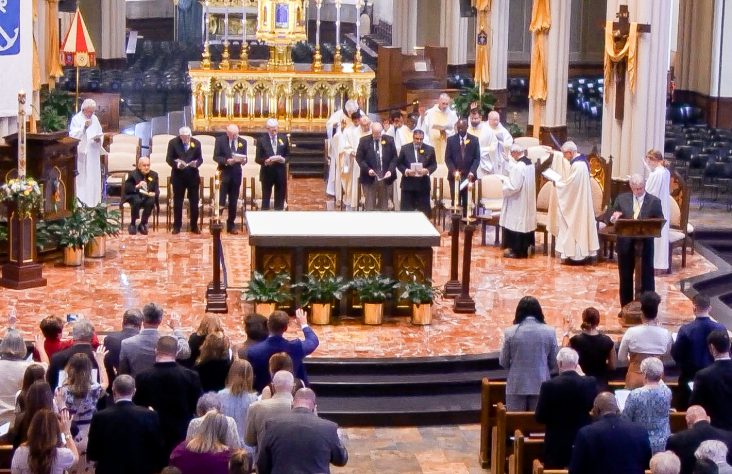November 7, 2023 // Vatican
Pope Encourages Children to Speak Up, Work for Peace
VATICAN CITY (CNS) – In a celebration of life, peace, joy, and harmony, thousands of children representing young people on every continent greeted Pope Francis during an afternoon event in Paul VI Hall at the Vatican on Monday, November 6.
The event was sponsored by the Dicastery for Culture and Education and was attended by more than 6,000 children from different parts of Italy and other parts of the world.
Dedicated to the importance of peace, fraternity, and respect for others and creation, the event was titled, “Let Us Learn from Boys and Girls,” to focus attention on children’s simple and sincere desires for peace and harmony in the world.
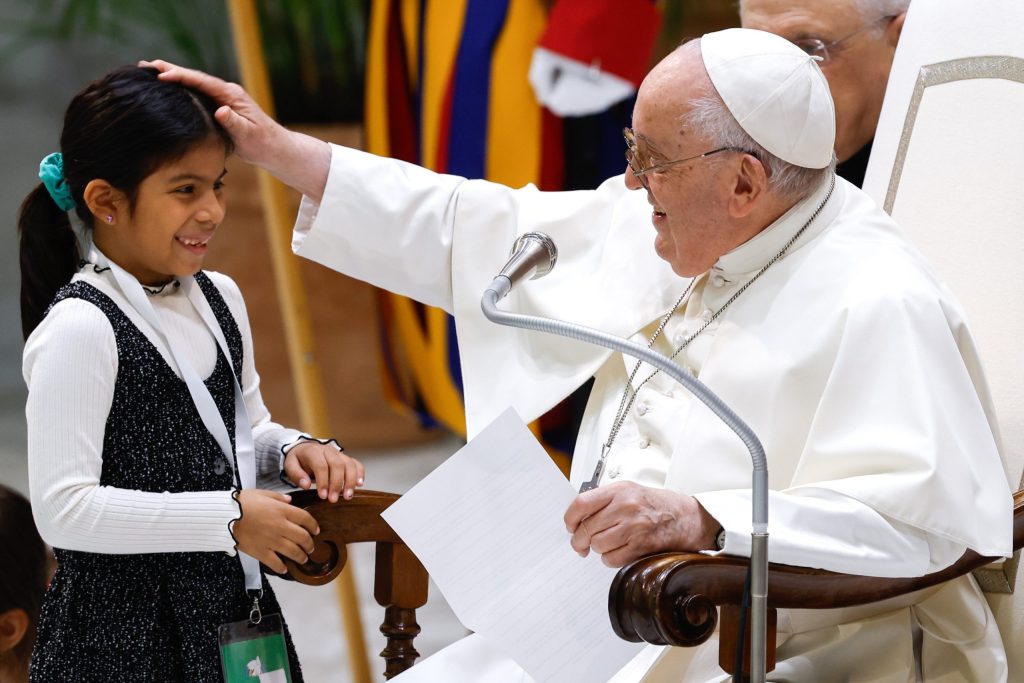
Pope Francis greets a child during a meeting with youngsters from around the world called “Let Us Learn from Boys and Girls” in the Paul VI hall at the Vatican Nov. 6, 2023. (CNS photo/Lola Gomez)
“There is much to learn from you,” the pope said. “I am always happy when I meet you because you teach me something new every time. For example, you remind me how beautiful life is in its simplicity and how beautiful it is to be together!”
“Two big gifts God has given us,” he said, are life and being together with simplicity.
The pope encouraged the kids to embrace their adolescence, which is “a wonderful age” and to make their thoughts, feelings, and experiences heard by adults.
He asked the children to remember all the other kids their age who are suffering from war, hunger, climate disasters, and poverty.
“You know there are bad people who do bad things, they make war and destroy. Do you want to do bad things?” the pope asked. After the children yelled, “No!” he asked, “Do you want to help?” to which they replied with enthusiasm, “Yes!”
The pope cut short his prepared speech in order to dedicate more time to questions from the children, who asked him about climate change, wars, his friends, his work habits, and what he dreams about at night.
“I don’t know what I dream because I am asleep!” he joked as the kids laughed. Sometimes, he said, he dreams about things he remembers when he was a child. “Dreaming is beautiful,” he said, because it shows something alive is stirring inside.
When a 9-year-old boy from Syria asked the pope, “Why do they kill kids during a war and no one defends them?” the pope said, “This shows the wickedness of war.”
That innocent civilians and children are killed in wartime, he said, “is cruelty,” and he led the children in praying the Our Father for all children killed in wars.
He urged all the children to work for peace after a 12-year-old girl from Palestine asked whether there would be no more peace if World War III broke out.
“We have to work for peace,” the pope said, asking everyone to wave to the girl so she could let the people back in Palestine know that everyone there said “Hello.”
“Peace is beautiful!” the pope said, as the children repeated it loudly.
Pope Calls for ‘Contextual Theology’
Calling for a major push toward developing a “fundamentally contextual theology, capable of reading and interpreting the Gospel in the conditions in which men and women live each day,” it was announced by Vatican officials on Wednesday, November 1, that Pope Francis has approved new statutes for the Pontifical Theological Academy.
The academy was founded in 1718 to train theologians; the last revision of its statutes, by St. John Paul II in 1999, asked members to pursue “the principal mission of theology today,” which, he said, “consists in promoting dialogue between Revelation and the doctrine of the faith, and in offering an ever deeper understanding of it.”
In an apostolic letter issued motu proprio (“on his own initiative”) on November 1, Pope Francis said that in a “synodal, missionary, and outgoing Church,” theologians must also dialogue with other sciences and with members of other religions and that helping Catholics have a deeper understanding of the Faith will be possible only if theology grapples with their questions and concerns.
“Promoting theology in the future cannot be limited to abstractly reproposing formulas and patterns of the past,” the pope said in the apostolic letter. “Called to interpret the present prophetically and to discern new itineraries for the future in the light of revelation, theology will have to confront the profound cultural transformations underway, aware that: ‘What we are living through is not simply an epoch of change, but it is the change of an epoch.’”
The model for “contextual theology,” he said, is the Incarnation, Jesus being born into and living in the world, walking with His contemporaries, and engaging with the issues that impacted their lives and faith.
With that starting point, the pope said, “theology cannot but develop into a culture of dialogue and encounter with different traditions and different forms of knowledge, between different Christian denominations and different religions, discussing openly with everyone, believers and non-believers alike.”
“Indeed,” Pope Francis wrote, “the need for dialogue is intrinsic to human beings and to the whole of creation, and it is the peculiar task of theology to discover the Trinitarian imprint that makes the cosmos in which we live ‘a web of relationships.’”
Pope to Travel to Dubai for Climate Conference
Pope Francis will travel to Dubai in the United Arab Emirates from December 1-3 to participate in COP28, the U.N. Climate Change Conference, officials with the Vatican Press Office confirmed on Friday, November 3.
The conference is designed to assess progress or failures in reaching the goals adopted by 196 nations and parties, including the Holy See, with the Paris Climate Agreement in 2015.
In an interview with Italy’s main evening news program on Wednesday, November 1, Pope Francis said the climate summit in Paris “was the most beautiful of all,” but since then “everyone has taken a step back and courage is needed to move forward.”
Too many people, he said, do not believe climate change is real and that it is threatening people’s lives and livelihoods today.
“We still have time to stop it,” the pope said. “Our future is at stake, the future of our children and grandchildren. People must take some responsibility.”
In early October, Pope Francis released Laudate Deum (“Praise God”), a follow-up document to his 2015 encyclical Laudato Si’ (On Care for Our Common Home), because, he wrote, over the past eight years, “our responses have not been adequate, while the world in which we live is collapsing and may be nearing the breaking point.”
He also wrote saying “it can represent a change of direction” and show that everything the international community has tried to do since the 1992 U.N. Earth Summit “was in fact serious and worth the effort, or else it will be a great disappointment and jeopardize whatever good has been achieved thus far.”
The best news. Delivered to your inbox.
Subscribe to our mailing list today.

